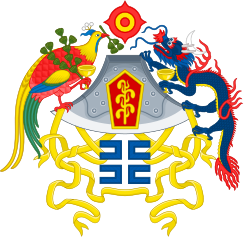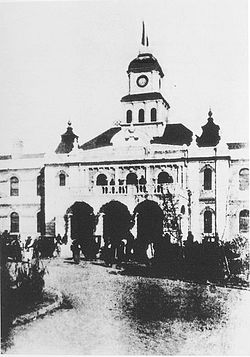Top Qs
Timeline
Chat
Perspective
Provisional Senate
From Wikipedia, the free encyclopedia
Remove ads
Provisional Senate of the Republic of China (Chinese: 中華民國臨時參議院), also translated to Advisory Council,[1] was the temporary legislature established in the earlier Beiyang years of the Republic of China, before the National Assembly was formed. The first Provisional Senate lasted from 1912 to 1913, and the second from 1917 to 1918.
This article needs additional citations for verification. (April 2025) |
Remove ads
History
Summarize
Perspective

In Nanking
On New Year's Day 1912, Sun Yat-sen assumed office as the Provisional President of the Republic of China, and thus the Provisional Government began. An earlier United Assembly of Representatives of the Provincial Military Governments, which selected Sun, started to act on behalf of the Senate on the next day, followed by choosing the temporary speaker and deputy speaker and amending the Organizational Outline of the Provisional Government of the Republic of China (Chinese: 中華民國臨時政府組織大綱), which governs the establishment of the Provisional Senate. At 11 a.m. on 28 January, the Provisional Senate, with 43 members, was formally opened in Nanking, at the Kiangsu Provincial Assembly Building,[2] thereby dissolving the assembly.
Discussions over enacting the Provisional Constitution of the Republic of China began on 7 February. Five days later Puyi abdicated as emperor of Qing dynasty, sending Yuan Shikai to form a republican government. Yuan was elected as the Provisional President on 15 February, succeeding Sun as part of the negotiated deal. The Provisional Constitution was adopted on 8 March. This was followed by other pieces of legislation such as the Senate Act (參議院法), and standing order and internal rules of the senate. [citation needed]
The Provisional Government and the Provisional Senate subsequently relocated to Peking, following two motions passed on 2 April, for the government, and on 4 April, for the legislature. The session adjourned on 8 April, and subsequently resumed on 29 April at the opening ceremony in Peking.[citation needed]
- Members of the Nanking senate on 1 April 1912 upon the resignation of Sun Yat-sen as Provisional President
In Peking
Apart from Tibetan members, senators across the new nation attended the Peking senate, situated in the former Qing-era Advisory Council Building. One of the amendments to the Organizational Outline passed was to expand the assembly to include Qinghai members. Amongst the other legislations adopted were election laws for senators and representatives, organizational acts of the National Assembly and the State Council. The Senate also established the Mongolian and Tibetan Affairs Agency, regulated the executive grades and salaries, unified the national flag, and introduced duty stamp.[citation needed]
Peking senate was succeeded by the National Assembly on 8 April 1913 when they convened the inaugural sitting.[1]
- Opening ceremony of Peking Senate
- Closing ceremony of Peking Senate
Remove ads
Power
Summarize
Perspective
During the Peking era, the powers of the Provisional Senate as dictated by the Provisional Constitution were -[1]
- To pass all law bills;
- To pass the budgets of the Provisional Government;
- To pass laws of taxation, of currency and of weights and measures for the whole country;
- To pass measurts for the calling of public loans and to conclude contracts affecting the national treasury;
- To give consent to matters in relation to granting amnesty, appointing members of the State Council (or cabinet) and ambassadors;
- To reply to inquiries from the Provisional Government;
- To receive and consider petitions of citizens;
- To make suggestions to the government on legal or other matters;
- To introduce interpellations to members of the cabinet and to insist on their being present in the Council in making replies thereto;
- To insist on the government investigating into any alleged bribery and infringement of laws by officials;
- To impeach the Provisional President for high treason, by a majority vote of three-fourths of the quorum consisting of more than four-fifths of the total number of the members;
- To impeach members of the cabinet for failure to perform their official duties or for violation of the law, by majority votes of two-thirds of the quorum consisting of over three-fourths of the total number of the members.
The senators also elected the Provisional President and the Provisional Vice-President, and may amend the Provisional Constitution. With the consent of the Provisional Senate, the Provisional President may declare war or ratify a treaty.[1]
Remove ads
Members
Summarize
Perspective
Members of the Provisional Government, Provisional President's office, and the Provisional Senate prepared to depart for Xiao Mausoleum to commemorate Hongwu Emperor of Ming dynasty[3][4]
The Organizational Outline only provided that each province should send at most three senators. On the date of founding the Provisional Senate had a total of 42 members, including 30 formal members (from Guangdong, Hubei, Hunan, Zhejiang, Jiangsu, Anhui, Jiangxi, Shanxi, Fujian, Guangxi) and 12 representatives (from Kweichow, Yunnan, Shensi, Szechwan, Fengtien, Chihli, Honan) acting on behalf of the senators that were yet to report duty.[5] The size grew to 45, or 39 as media reports varied,[6] on 1 March.[7][8]
According to Article 18 of the Provisional Constitution which came into effect on 11 March, each of the 22 provinces, Inner and Outer Mongolia, and Tibet shall elect five members to the Provisional Senate and one for Chinghai. This gives the total number of senators at 126. However, not all members were deputed throughout the session.
Remove ads
Speaker
The Speaker and the Deputy Speaker were elected amongst the senators. The whole house of Nanking senate also elected the Presiding Officer (審議長) on 5 February.[9]
Remove ads
Committees
In Nanking various committees were formed.[9]
- Foreign Affairs Review Committee (外交審查會), chairman not elected
- Petitions Review Committee (請願審查會), chairman not elected
- Bills Review Committee (法律審查會), chaired by Wang Chengting
- Finance Review Committee (財政審查會), chaired by Pan Zuyi
In Peking six committees were formed.[12]
- Whole House Committee (全院委員會), chaired by Ku Chung-hsin
- Legal System Committee (法制委員會), chaired by Chang Yao-tseng
- Finance Committee (財政委員會), chaired by Yin Ruli
- Home Affairs Committee (庶政委員會), chaired by Zheng Wanzhan
- Petitions Committee (請願委員會), chaired by Tseng Yen
- Reprimand Committee (懲罰委員會), chaired by Peng Zhanyuan
Remove ads
Reincarnation
Another Provisional Senate was set up between 10 November 1917 and 12 August 1918. It was established after the dissolution of the first National Assembly in June 1917 and in the aftermath of the failed Manchu Restoration, with an election held on 14 November. Wang I-tang was the speaker and deputised by Nayant. It dissolved as the second National Assembly was founded.[13] There were a total of 113 senators. Some of whom had served in the Nanking or Peking Senate.
Remove ads
References
Wikiwand - on
Seamless Wikipedia browsing. On steroids.
Remove ads














